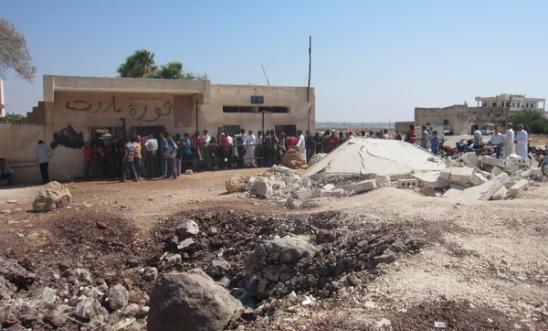
A four-day ceasefire to mark the Muslim holiday of Eid al-Adha has come into effect, albeit patchily, in Syria.
The BBC’s Lina Sinjab reported this morning from the capital:
Damascus hasn’t had a quiet morning for a long time, but so far, the ceasefire is being honoured. During the Eid holiday people visit cemeteries where their beloved are buried and put flowers on their graves. There are thousands of new graves to be visited today
Yet, almost as soon as the ceasefire had started, the killing resumed and hopes for its impact seem to be fading fast. The Guardian is live blogging reported breaches of the temporary truce.
The ceasefire has been promoted by UN-Arab League envoy Lakhdar Brahimi and is backed by the UN Security Council. Optimists hoped it could kick-start political reconciliation, but frankly this looks a long way off, in the midst of an otherwise deteriorating situation. There has been a sharp increase in casualties in recent weeks, with the Syrian government showing disdain for international humanitarian law and elements of the armed opposition causing the deaths of civilians through their operations.
What the ceasefire could do, however, is grant some urgent temporary respite for the victims of a war which has already claimed some 30,000 lives.
As my Amnesty colleague Kristyan Benedict blogged a few days ago:
A ceasefire could immediately allow the carrying out of essential and urgently needed humanitarian work that obviously cannot be undertaken during the fighting. As well as addressing the needs mentioned above, there is an urgent need to evacuate those who want to leave but have been unable to do so safely, and to provide humanitarian relief and assistance to those who want or need to remain. Medical facilities desperately need new supplies, equipment and medication – this means humanitarians accessing these places whilst there is a cessation of fighting.
Just yesterday the ICRC noted the dangers presented to its own people amid the fighting:
On 21 October, a Syrian Arab Red Crescent volunteer died after being caught in the fighting on his way to work in Harasta, Rural Damascus. The following day, another two volunteers were injured in separate incidents while on duty, also in Harasta. Under international humanitarian law, parties to an armed conflict must distinguish at all times between civilians and those involved in fighting.
It is unsurprising therefore that the prospects of a ceasefire were welcomed by the Red Cross, with the BBC quoting spokesman Alexis Heeb:
Any truce would not only allow some of the humanitarian help to reach them, but it would also allow all the people who’ve been holed up in bunkers and at home, and also displaced in camps to rest a bit and to do normal things that they would do in a normal day.
Let’s hope it can at least still serve this limited purpose.
Slugger readers and commenters will get a chance to support the work of the Red Cross / Red Crescent in Syria at the Great Big Politics Pub Quiz next month. Please get the word out and get your teams together for Tuesday 20 November at the Black Box. You can now buy advance tickets via The Black Box website. Every penny will go to the Red Cross Syria crisis appeal.
I am the Northern Ireland Programme Director and Head of Nations and Regions at Amnesty International UK.
I’m on Twitter at @PatrickCorrigan
Discover more from Slugger O'Toole
Subscribe to get the latest posts to your email.
